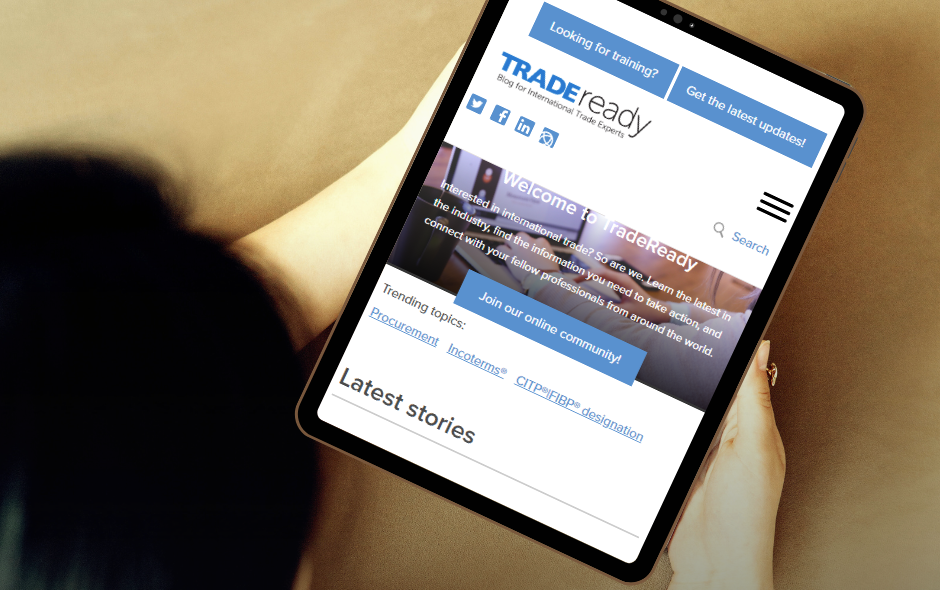
Delivery Factors Within a Transaction
Delivering goods and/or services within a country can be complex in certain situations. Sending goods and/or services across international boundaries is challenging even for large multinational corporations, and can be a daunting experience for many small-and-medium-sized companies.
When it comes to exporting goods, an exporter must know the route a shipment is to travel so that it can be prepared for any special needs or risks during shipping. An exporter must also be aware of all import and export regulations, other regulations affecting shipped goods, and what the conditions are like at the destination point.
Will a destination port receive containers? Will handling facilities be available? As it is not always easy to get answers to these questions, even experienced exporters will benefit from the assistance of experienced intermediaries.
Exporters of goods need to keep these seven services in mind when managing international deliveries, and budget accordingly, to take advantage of them when needed.
1. Freight Forwarders
Freight forwarding is a service industry that provides a wide range of advisory, administrative and physical services to shippers to aid the international movement of goods. Freight forwarding companies arrange for the transportation and delivery of goods and commodities.
Freight forwarders provide or arrange for packaging, storage, handling, export credits, insurance and trade documentation (which might include customs clearance). Other services freight forwarders offer include:
- Arranging or providing shipment handling requirements for packing, crating, marking, inspection and storage of shipped goods
- Preparing shipping and customs documents
- Translating, certifying or transmitting documents
- Obtaining permits, licences and certificates
- Providing financial assistance by helping companies arrange documentary letters of credit or arrange collections
2. Non-Vessel Operating Common Carriers (NVOCC)
Freight forwarders may be engaged by shippers as agents or as transportation intermediaries. As agents, forwarders charge a fee that includes payment for their services, plus the cost of the transportation services.
When acting as a transportation intermediary, the forwarder pays the carrier, regardless of whether there is enough cargo available to fill the space it has purchased.
In this role, the forwarder acts as a carrier and is therefore known as a non-vessel operating common carrier (NVOCC).
NVOCCs book space on cargo ships in large quantities at lower rates, and sell space to shippers in smaller amounts. NVOCCs consolidate small shipments into container loads that move under one bill of lading. In this capacity, the forwarder can also operate as a broker. It receives a percentage of transportation charges or brokerage fees from air, highway or ocean transportation companies for finding shippers with goods to be transported.
3. Trading Houses
Trading houses are international trading companies that specialize in helping companies import or export goods. International trading houses are commercial intermediaries that focus on the long-term development of trade in goods and services that are supplied by other parties. Trading houses concentrate on exporting, importing and third country trading as core activities.
4. Cargo Insurance
Insurance is necessary to avoid the risk of major financial losses if cargo is damaged or misplaced. In most cases, loss or damage occurs during loading and unloading or while cargo is being stored between transport stages. Cargo insurance is offered under ocean marine policies. Despite the name, ocean marine insurance can cover goods being transported by air, rail, road or by marine transport.
5. Requirements for Insurance
To obtain insurance, a company must demonstrate that it has insurable interest in the goods being transported. The company can only have insurable interest if it faces the risk of a loss, if it has a financial interest in the safety of the goods, and if it does not have the potential to profit by applying for insurance.
Cargo insurance is a negotiable, transferable document. It is important to know that insurance interest needs to be set before the time of the loss.
There are many types of insurance policies that a company can obtain to cover its insurable interest. Under any type of insurance policy, it is important to negotiate and obtain optimal coverage at competitive rates, and to be aware of the procedure by which claims must be filed.
6. Third Party Logistics Providers
Third party logistics (3PL) is a common supply chain management practice in which a company outsources logistics functions to another company. The functions that are outsourced vary from company to company, but usually include one or more of the following:
- Inbound freight
- Customs and freight consolidation
- Warehousing
- Order fulfillment
- Distribution
- Management of freight to customers
Using a 3PL company can enable an organization to enhance its customer service offerings because it can use the international distribution networks and insider knowledge of importing and exporting that have been established by the 3PL.
Using a 3PL is especially beneficial to medium-sized companies, helping them remain lean and competitive while receiving the most cost-effective services.
A smaller company might not benefit from using a 3PL because the company’s logistics structures might not be large enough to justify the commissions that the 3PL will charge to take over planning and managing the functions.
Get your products and services where they need to be faster than ever before, while still maintaining quality standards and meeting all legal requirements with the FITTskills International Distribution online workshop!
7. Risk Elements and Related Costs
Any arrangement with buyers and suppliers has elements of risk—however, risks associated with international trade are often higher. Commercial, country and foreign exchange risks all exist to varying degrees in international trade, and managing or eliminating these risks can be costly. Failure to address them adequately may eliminate all profit.
Discussions with banks, insurers and export credit agencies (ECAs), will be required to ascertain the cost of managing financial exposure after assessing the commercial and country risk factors.
Volatility is a reality in international transactions, and the impact of this will vary depending on the countries involved and the goods or commodities being bought or sold.
Commodity prices fluctuate daily, and while commercial contracts and/or guaranteed forms of payment will fix prices, extraordinary circumstances can sometimes add costs or present an opportunity for the importer to reduce the price paid.
Such extraordinary circumstances often lead to unforeseen costs and the risk of this is often difficult to accurately predict or to cost with precision. Consequences of a volatile target market include:
- Dispute resolution costs
- Demurrage charges (delays in loading or unloading vessel)
- Delays in transit
- Documentation errors or omissions
- Legal fees
- Delays in funds transfer
- Unanticipated costs due to travel or other expenses






disqus comments